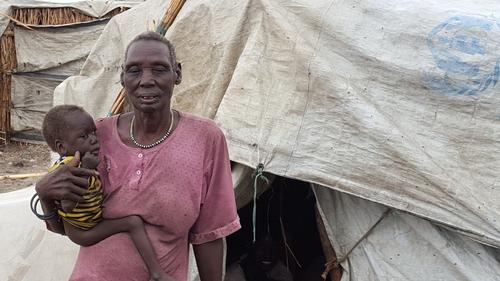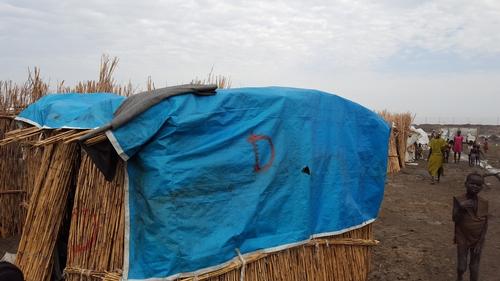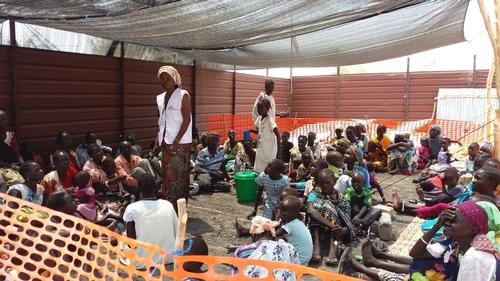In the Bentiu protection of civilians camp (PoC), in the north of South Sudan, Nantiek is the leader of a family of 12. She is facing a second eviction order from the UN PoC administration since arriving with her family from Leer city several months ago fearing for their lives and leaving everything behind.

Nantiek stands with bare feet in the mud, gently carrying her youngest granddaughter in her arms. The little one suffers from a severe disability. Nantiek is tired, but she speaks with confidence and strong words. She’s been through so much difficulty since she and her family fled from their village near Leer – around 120 kilometers away – to escape war, violence and hunger.
“Our house was looted, our cattle were looted, we had to flee, and we couldn’t stay. We left everything behind,” says Nantiek, repeating the story of hundreds of families. “We were hungry also,” she adds. “Here, at least they won’t kill us, they give us some food and some water, a shelter and we can go to the health centre or to the MSF hospital when we are sick. But now they want us to move again inside the camp. We moved already. We were in PoC 3, they told us to move to PoC 2, and now they want us to move again but they don’t give us a place, a shelter. I’m tired to move.”
There is a D on the blue plastic sheet for ‘Displacement’. This means people who settled there previously after an exhausting process have to move again inside the camp. They don't always have another area allocated and have to find relatives to settle with.

Nantiek and her family have found refuge in the UNMISS (United Nations Mission in South Sudan) PoC camp in Bentiu. They have lived there since June 2015; for many others, it has been even longer. Following the recent surge in violence at the start of July, more people have since sought safety in the camp. This is particularly concerning, as from 1 July no new arrivals have been allowed to register, meaning thousands of people fleeing violence are now living without adequate shelter or food. Nantiek is willing to go back. “I want to return to my village, my cows, my crops, but we lost everything. We are not well here. But we need security.” In the meantime, Nantiek will remain here, between the fences and the moats of the Bentiu PoC, under UNMISS protection, but also pressure to resettle elsewhere in the camp
MSF runs a community health programmed in the Bentiu UN protection of civilians camp, as well as a 160-bed hospital providing secondary healthcare, surgery and emergency services to the population of the camp. MSF also runs an inpatient therapeutic feeding centre for malnourished children and provides maternal care for complicated cases, obstetrics, and a sexual violence programmed. In the town of Bentiu, the medical team also operates a primary health centre which can refer patients to the town’s hospital or to the MSF hospital in the PoC.




